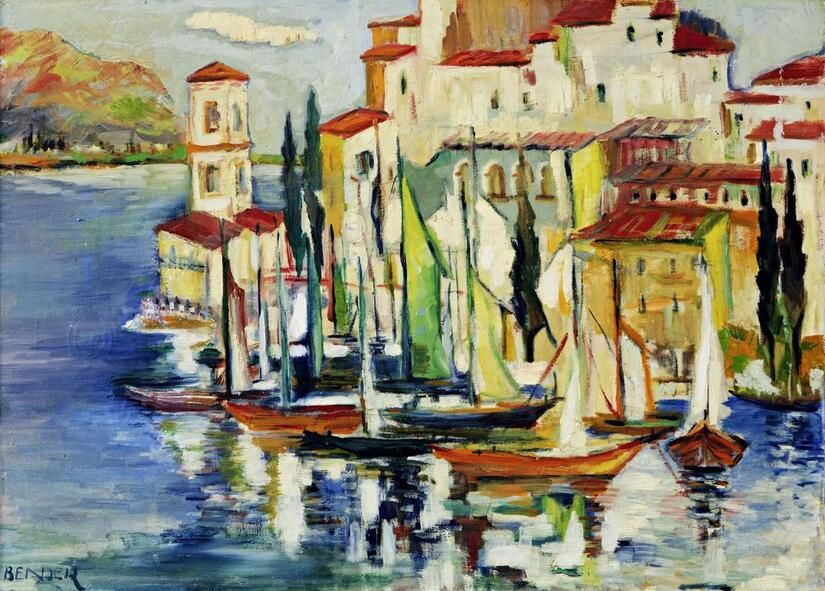Adolf Bender: Schiffe und Hafen, Entstehungsdatum unbekannt (Ships and port, date of origin unknown)

Oil painting, 104 x 78 cm
A Mediterranean scene, impressions from the south of Europe. It shows the typical, high-rise houses with small windows against the heat, buildings and landscape reflected in the water of the harbour basin, cypresses and small sailing boats that make the carefree atmosphere of the Mediterranean tangible. Southern cities and landscapes with motifs mainly from Greece, but also from the South of France are part of Bender's repertoire, much of whose early work was unfortunately lost during the Second World War. The Wehrmacht had sent the convinced democrat to Greece in 1942. There he found distraction from military service, which was in stark contrast to his convictions: Bender was deeply fascinated by Greece's classical culture and landscape and sought a balance to the soldier's life there. During his stay in Athens, he visited the Acropolis almost daily and later in Crete he had "plenty of time, especially at the Mesara Bay, to make my sketches and studies, because the landscape was simply ideal for a painter's eye". (from: "Adolf Bender - A painter's life", St. Wendeler Druckerei und Verlag 1993, p. 56).
Adolf Bender (*1903 in Mainz, †1997 in St. Wendel, both in Germany) was a painter and a proven democrat from the nearby district town of St. Wendel. He is associated with the Europäische Akademie Otzenhausen not only through his two exhibitions, which he showed here in 1962 - then the third exhibition of the Academy - and in 1985 ("Die Moorsoldaten - Demokraten im KZ" - "The Peat Bog Soldiers - Democrats in the Concentration Camp"), but also through his democratic convictions. As a politically active opponent of the National Socialists, Bender fled to France, was interned in the concentration camps of Börgermoor and Esterwegen after his return, and was finally drafted into the Wehrmacht in 1941. "To prevent this from happening again," he said, he fought against fascism after the war with art and education. Well known is his "Peat Bog Soldiers series", in which he reappraises his experiences in the Börgermoor. The Adolf Bender Center for Democracy and Human Rights in St. Wendel continues to work in his spirit.